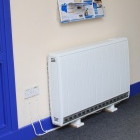New electric heating boosts EPC rating

Dimplex’s Quantum off-peak electric heating system has replaced outdated electric storage heaters in an industrial unit on a business park in Ashford, Kent, to improve efficiency and reduce running costs. The new heating system in the headquarters of Kent Invicta Chamber of Commerce has raised the Energy Performance Certificate (EPC) from F to E, making it compliant with the upcoming 2018 regulations on minimum energy performance standards for commercial buildings.
The 22 heaters comprise Dimplex Quantum heaters and intelligent Q-Rad electric radiators.
Terry Baker, director at Terry Baker Electrical Contractor Ltd, which installed the heaters, said, ‘Dimplex Quantum is simple to install, covers the footprint of existing heaters and delivers outstanding results in terms of efficiency, control and running costs.’
Quantum 070 and 150 storage heaters were installed throughout the building — including meeting rooms, offices, corridors and the atrium.
They draw energy during cheaper, off-peak periods and offer controllable heat on demand. An intelligent controller monitors the user’s heating habits and provides easy operation.
The Q-rad electric radiator was installed in the toilets and two meeting rooms. They have a self-learning algorithm that calculates when the heater needs to start to reach the required temperature at a specified time.







